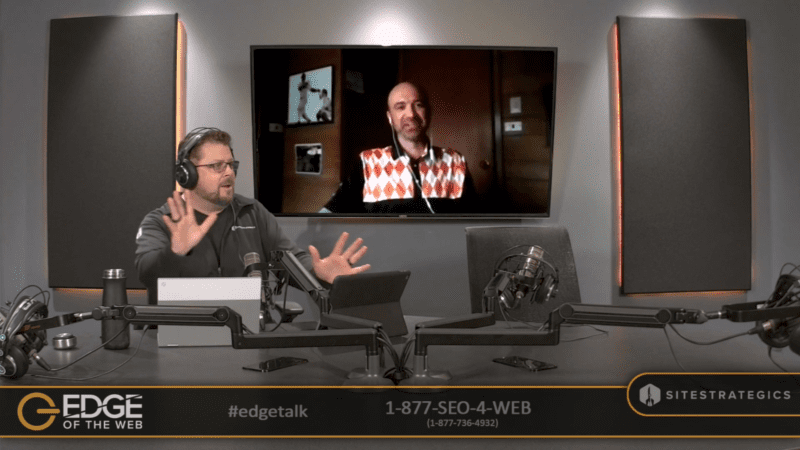If you’re ready to catch up on digital marketing headlines, check out the news roundup segment that kicks off each episode of the EDGE. The latest features host Erin Sparks and Creative Studio Producer Jacob Mann along with special guest Joe Pulizzi, Founder of the Content Marketing Institute. Here’s the roundup from Episode 328 of the EDGE of the Web podcast:

Google Chrome Will Block Mixed Content
From Roger Montti on Search Engine Journal we learn that Google Chrome Will Block Mixed Content. Google announced that Chrome browser will begin blocking web pages with mixed content beginning December 2019. Publishers are urged to check their websites to make sure there are no resources that are being loaded using the insecure HTTP protocol.
- Erin Sparks: Mixed content is when a secure website (HTTPS) also contains some scripts, styles, images and other linked content that is served through an insecure HTTP protocol. There have been issues with Chrome letting users know that a site is insecure because of the broken HTTPS. They’re now going to handle it differently starting in December 2019. They will automatically either upgrade HTTP content to HTTPS if that resource is available. Meaning if you’ve got a hard link, a hard coded graphic that’s on your site and if Google can go to HTTPS and the resource is still there, it’s going to load up. However, if you have some external scripts or things that are running on your site that are truly non-secure, those scripts won’t run. What do you think of this, Joe?
- Joe Pulizzi: One way to look at it is they’re looking out for our security. But another way to see it is how Google makes it so difficult for us in every manner. How many things do we have to do to keep up with what Google wants us to do? And when you look at all the content Google is purchasing and pulling in, it’s like they don’t even need the rest of us to provide search results. For the really cynical people, it’s like Google distracts us and then sneaks their own content in to replace what everyone else is providing.
- Erin Sparks: We’re all playing in their sandbox, and then they’re making us do the Google dance again and again and again. But I guess we just have to.
- Joe Pulizzi: But do we have to? Well, we see so many clients who get 50% or more of their traffic from Google. That’s a scary place to be. Maybe we need to look at diversifying more so you don’t have to rely on Google for so much of your traffic. Build a real audience and you won’t have to depend so much on one source of traffic. And the way to do that is long-term content marketing.
GDPR-compliant companies outperforming peers across a wide range of metrics
As reported by Greg Sterling on Marketing Land, GDPR-compliant companies outperforming peers across a wide range of metrics. According to a new report from Capgemini research, compliance with the EU’s GDPR has yielded a range of significant and perhaps unanticipated benefits, from increased consumer trust to better customer engagement and revenue growth. Overall, the researcher says that “[GDPR] compliant organizations have outperformed non-compliant [companies] by an average of 20%.”
- Erin Sparks: Among the retailers that have complied with GDPR, 74% have seen an increase of participation in their loyalty programs, 80% have seen an increase in the number of consumers targeted by their campaigns, and 83% have seen an increase in online sales since GDPR took effect. But is it really attributable to GDPR specifically?
- Joe Pulizzi: I’m skeptical on this as well. How do we know it wasn’t because they upped their eNewsletters or collected emails at a trade show or something like that. I would like to believe this is true, but I think it’s more likely that the GDPR-compliant companies just so happen to be the ones who already know how to consistently communicate with their customers via email content.
- Erin Sparks: The surveyed a bunch of senior executives from various industries such as insurance, banking, consumer products, utilities, telecom, public services, and healthcare. Those are all industries where privacy is already a big thing.
- Joe Pulizzi: And how many senior executives do you know that would even have a clue to begin with whether or not their company is GDPR-compliant?
Multiple H1s won’t get in the way of your SEO, Google Says
On Search Engine Land, George Nguyen reports Multiple H1s won’t get in the way of your SEO, Google Says. Google still uses semantic headings to understand the context of different parts of your pages, though. “Our systems don’t have a problem when it comes to multiple H1 headings on a page,” said Webmaster Trends Analyst John Mueller on the October 3 edition of #AskGoogleWebmasters.
- Erin Sparks: For years it was the standard practice for SEOs that you would only use an H1 headline once, for the title. From there your content would be logically structured and use the other heading tags as it made sense according to an outline. It used to be no multiple H2s either. But multiple H3s were okay. Having Google say the heading levels don’t matter really rocked the SEO world. Google’s really only paying attention to semantic analysis to figure out a page’s content.
- Joe Pulizzi: Again, doesn’t it all kind of feel like a big distraction? But it would certainly be terrible if people started making all their content H1 just because they can.
Connect with Joe Pulizzi, Founder of the Content Marketing Institute
Orange Effect Foundation: http://theorangeeffect.org
Twitter: @JoePulizzi (https://twitter.com/joepulizzi)
LinkedIn: https://www.linkedin.com/in/joepulizzi
Facebook: https://www.facebook.com/joe.pulizzi
Instagram: @joepulizza (https://www.instagram.com/joepulizzi)
Website: https://www.joepulizzi.com
CMI Twitter: @CMIContent (https://twitter.com/CMIContent)
CMI Website: https://contentmarketinginstitute.com
CMI FB: @ContentMarketingInstitute (https://www.facebook.com/ContentMarketingInstitute)
Get Your Digital Marketing News from the EDGE Newsletter
If you love the kind of insightful analysis of the latest digital marketing news you hear on the EDGE, why not get it delivered directly to your inbox? Go to EDGEofthewebradio.com and you’ll see the subscribe box at the very top of the page. It’s free-of-charge, and we will never use your email for anything except sending you the newsletter. You can also sign up by texting the word “EDGETalk” to 22828, but not while you’re driving! Enjoy these digital nuggets of gold from the EDGE – your source for digital marketing news.


